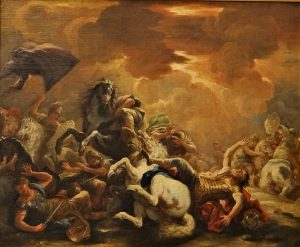|
|
Interesting Reading in the Interweb Tubes
Headline of the Week
Nonbookish Linkage
Bookish Linkage
- When he became Nobel Literature laureate, Abdulrazak Gurnah’s had sold 3,000 books in the U.S.
Life assembles itself on accumulating mistakes.
Richard Powers, Bewilderment
In the last installment of this series, Beyoncé faced a 2016 lawsuit accusing her of, among other things, conspiring with the CIA. On September 19, 2018, Kimberly Thompson, a former drummer in Beyoncé’s band, sought a restraining order, alleging the singer was constantly harassing her. But it was far more than what just those facts might lead you to believe. No, this harassment came through “extreme witchcraft.”
At the outset, it should be noted that Thompson is, by all accounts, an excellent drummer who continues to perform and record. The bizarre nature of her claims hints at mental health issues, although Thompson told The Daily Mail that Beyoncé bullied her for six years out of jealousy. She also said she requested the temporary restraining order “to cut the cord” with someone she once loved and “put on a pedestal.”
Thompson’s sworn, handwritten request contained some relatively ordinary harassment allegations, such as anonymous phone calls, tapping her phone, and stalking, as well as stealing intellectual property. But the majority of her claims were strange, to put it mildly. Among other things, she said Beyoncé was guilty of
- practicing “black magic” and “sexua magic.”
- “[s]talking me w/black birds.”
- paying past employers to fire her.
- controlling her finances and tapping her bank accounts.
- “[p]utting witchcraft on my past lovers + working relationships.”
- “[s]howing up as my uber + lyft drivers [and] as workers in common areas like grocery stores.”
- placing a spell on Thompson’s three-month-old kitten and murdering the kitten three months later.
The request offers no explanation for this alleged activity. Thompson does not appear to have publicly commented on the case other than in The Daily Mail interview. Beyoncé neither responded to the request nor commented publicly on it.
Thompson’s request was denied the same day it was filed, pending an October 11, 2018, hearing. She did not appear at the hearing so the judge assigned to the case dismissed it. But perhaps the judge acted too quickly. After all, it’s well known that Beyoncé is part of the Illuminati.
Being a professional musician doesn’t mean you spend 12 hours a day playing music. It means you spend up to 12 hours a day taking care of business, dealing with litigation, with the various characters who’ve stolen your interests, or fending off hostile lawsuits from former members of the band.
Robert Fripp, The Telegraph, December 8, 2005
Oxford University’s Bodleian Library is one of Europe’s oldest libraries and one of the world’s eminent research libraries. Yet, some of its books carry a taint of unscrupulousness given the time of its founding. One of its founding collections is plunder from Portugal in 1596.
Between 1584 and 1604, Protestant England and Catholic Spain fought an intermittent undeclared war sparked by religion and privateering. Portugal, also Catholic, was ruled by and considered part of Spain beginning in 1580. In June 1596, troops led by the second Earl of Essex, Robert Devereux, sailed with a joint English-Dutch fleet. On June 30, the troops captured Cadiz, Spain, and ransacked it.
Devereux’s forces sailed northwest and on July 23 attacked Faro, the capital of the Algarve region of southern Portugal. Meeting little resistance, they quickly controlled the city. Devereux occupied the palace of D. Fernando Martins de Mascarenhas, Bishop of the Algarve. Mascarenhas, a renowned scholar and theologian, had an important private library on theology and canon law. There was little wealth in the town, so the English set it afire and departed on July 27. To avoid leaving empty-handed, Devereux plundered items from the bishop’s library.
Two years later, Thomas Bodley offered to restore the University of Oxford’s library, abandoned a few decades before. In 1600, Devereux gave Bodley 215 volumes, according to Peter Booker of the Algarve History Association. The covers of 91 volumes carried Bishop Mascarenhas’ coat of arms embossed in gold. It’s unknown if they’re the entirety of the bishop’s library, as one other volume and another manuscript are dedicated to the bishop but don’t have his coat of arms, Booker reports. Likewise, some of the library’s books may have belonged to the bishop’s predecessors.
 17th-century engraving of Bodleian library interior Bodley’s rebuilt library opened on November 8, 1602, under the name “Bodleian Library,” with 2,000-2,500 books. According to Richard Ovenden, Bodleian’s Librarian, the Mascarenhas books remain on the shelves and “have moved only a few yards” in more than 400 years. “The theft of knowledge has a long history,” Ovenden says in his 2020 book Burning the Books: A History of Knowledge Under Attack.
That libraries around the world may contain plundered material raises complex issues. “To Essex, Bodley and others in the country, these books would have been seen as a legitimate ‘prize’,” he writes. At the same time, these “displaced or migrated” books raise the question of control of a community’s cultural and political identity.
The view of “Faro 1540,” an association formed to defend and promote Faro’s cultural heritage, is clear. In December 2013, it unanimously approved a motion requesting the return of the books, which it considers historical and cultural treasure. The association sent a formal request and a copy of the motion to the Bodleian Library, Queen Elizabeth II, the British Prime Minister, and the British Embassy in Portugal. The existence or status of any discussions between the association and the library or their respective governments is unknown.
Others ask how the books would have fared were they not in the library. Before Devereux’s literary looting, they were “tormented in a pittifull [sic] manner, [such] that it would grieve a man’s heart to see them,” Thomas James, the Bodleian’s first librarian, recorded. Inquisition censors blotted out what they regarded as heretical sentences and pasted supposedly offensive pages together. Ironically, in July 1616, Mascarenhas became the Inquisitor General of Portugal and compiled a list of authors condemned on religious grounds. Yet today, they are in good shape for their age, on climate-controlled shelves, and accessible to researchers worldwide.
While “ownership” of the books is unresolved, they are safe and secure, Devereux’s fate was worse. The year after donating the books – and before the Bodleian Library opened – he was beheaded for treason.
Libraries and archives were not created or run with the same motivation as those in the modern world, and it is dangerous to draw analogies between these ancient collections and those of today.
Richard Ovenden, Burning the Books: A History of Knowledge Under Attack
(Originally posted at History of Yesterday)
Nonbookish Linkage
Bookish Linkage
- The National Book Award finalists were announced. I’ve read none (!) in nonfiction, one of the novels with another on my tablet, and one in translated lit
[I]n these lands belief comes before everything else, even if it’s superstition, or simply wrong.
Zülfü Livaneli, Disquiet
St. Paul is widely considered as perhaps the most important person after Jesus in the history of Christianity. The Bible’s Acts of the Apostles gives three accounts of how he went from Saul of Tarsus, a zealous persecutor of Christians, to Paul, a man who traveled thousands of miles spreading Christianity. Based on those accounts, a planetary scientist believes a meteoric fireball may have led to Paul’s conversion.
Acts contains a third-person account of Paul’s conversion, believed to be written by St. Luke, and two of his own. Although differing slightly in details, they are relatively uniform. He was traveling to Damascus to arrest Christians and return them to Jerusalem for punishment. About midday, he saw “a light from heaven, brighter than the sun shining round me and those who journeyed with me.” (Acts 26:13). They all fell to the ground. Paul then heard the voice of Jesus asking why Paul was persecuting him. The stories differ on whether his companions heard the voice.
 “The Conversion of St. Paul” by Luca Giordano All three accounts say the light came “from heaven.” Luke’s version and one of St. Paul’s also say the light blinded him for several days. A Christian in Damascus laid hands on Paul, according to Luke, “[a]nd immediately something like scales fell from his eyes and he regained his sight.” He was then baptized.
On February 15, 2013, a meteorite about the size of a six-story building streaked through the sky above Chelyabinsk, Russia, before exploding into a fireball. The ubiquity of cameras and the number of people who saw the event make it the most well-documented of such incidents. The details of Paul’s conversion are a “strikingly good match” to the Chelyabinsk fireballs and similar incidents, according to a 2015 paper by William Hartmann. “Everything they are describing in those three accounts in the book of Acts are exactly the sequence you see with a fireball,” Hartmann, co-founder of the Planetary Science Institute in Tucson, Arizona, told New Scientist magazine.
Hartmann’s paper compared the stories in Acts with information about the Chelyabinsk event, the huge 1908 explosion caused by an asteroid in Tunguska, Russia, and other fireball incidents. He based his hypothesis on several factors, including:
- the accounts say the light was brighter than the sun even though it occurred around noon. The Chelyabinsk fireball was estimated to be about three times brighter than the sun.
- the travelers saw the light in the sky, and the accounts suggest it was moving, which is consistent with a meteorite coming to earth.
- Paul and everyone accompanying him fell to the ground, suggesting a shock wave. The explosion in Chelyabinsk knocked people off their feet, broke thousands of windows, and collapsed roofs. The Tunguska explosion also knocked people to the ground and broke windows.
- whatever Paul heard was after he saw the light and people were on the ground, a sequence expected with a fireball.
- descriptions of Paul’s blindness and recovery are consistent with a condition known as photokeratitis, temporary blindness caused by exposure to intense radiation. Saying the recovery of his sight being like scales falling from his eyes “beautifully matches” how sight can return in severe cases of photokeratitis.
Hartmann admits that the information in Acts is too sketchy for conclusive findings, especially since little to no additional evidence exists. “My goal is not to discredit anything that anybody wants to believe in,” he told New Scientist. Instead, he is pointing out that cultural concepts influence perceptions of extraordinary events. It would not be unusual for someone in the first century to consider a fireball a divine event. “If it was a Chelyabinsk fireball that was responsible for Paul’s conversion, then obviously that had a great impact on the growth of Christianity,” Bill Cooke, manager of NASA’s Meteoroid Environment Office, told the magazine.
Paul helped make Christianity more than a branch of Judaism by insisting his mission was to preach the gospel to Gentiles. But, given Hartmann’s analysis, one can’t help but wonder if Christianity became a universal faith because of an exploding meteorite.
If Christ were here there is one thing he would not be–a Christian
Mark Twain’s Notebook
(Originally posted at History of Yesterday)
|
Disclaimer 
Additionally, some links on this blog go to Amazon.com. As an Amazon Associate I earn from qualifying purchases. There is no additional cost to you. Contact me You can e-mail me at prairieprogressive at gmaildotcom.
|









